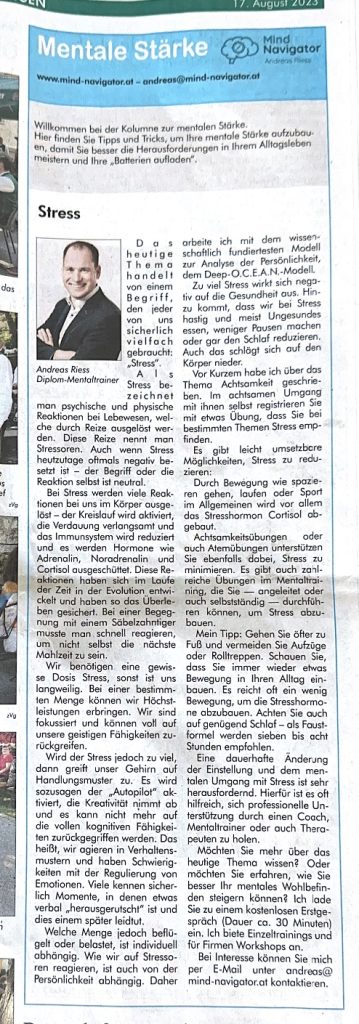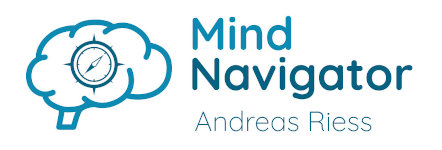Column Ybbstaler: Stress
 Welcome to the mental toughness column. Here you will find tips and tricks to build their mental strength, so they can better cope with the challenges in their daily lives and „recharge their batteries“.
Welcome to the mental toughness column. Here you will find tips and tricks to build their mental strength, so they can better cope with the challenges in their daily lives and „recharge their batteries“.
Today’s topic is about a term that each of us certainly uses a lot: „stress“.
Stress refers to psychological and physical reactions in living beings that are triggered by stimuli. These stimuli are called stressors. Even though stress often has negative connotations these days, the term or reaction itself is neutral.
Stress triggers many reactions in our bodies – the circulation is activated, digestion slows down, the immune system is reduced and hormones such as adrenaline, noradrenaline and cortisol are released. These reactions have developed over the course of evolution and have thus ensured survival. When encountering a sabre-toothed tiger, you had to react quickly to avoid becoming the next meal yourself.
We need a certain amount of stress, otherwise we get bored. We can achieve maximum performance with a certain amount. We are focused and we can make full use of our mental abilities.
However, if the stress becomes too much, our brain resorts to action patterns. The „autopilot“ is activated, so to speak, creativity decreases and the full cognitive abilities can no longer be used. This means that we act in behavioral patterns and have difficulties regulating our emotions. Many of us have certainly experienced moments when something has „slipped out“ verbally and we regret it later.
However, the amount of stimulation or stress depends on the individual. How we react to stressors also depends on our personality. That’s why I work with the most scientifically sound model for analyzing personality, the Deep Ocean Model.
Too much stress has a negative effect on health. What’s more, when we are stressed, we eat hastily and usually eat unhealthy food, take fewer breaks or even reduce our sleep. This is also reflected in the body.
I recently wrote about the topic of mindfulness. In mindful interaction with themselves, with a little practice they register that they feel stress when it comes to certain topics.
There are easy-to-implement ways to reduce stress:
Exercise, such as walking, running or sport in general, reduces the stress hormone cortisol in particular.
Mindfulness exercises and breathing exercises also help you to minimize stress. There are also numerous exercises in mental training that you can do – guided or independently – to reduce stress.
My tip: walk more often and avoid elevators or escalators. Make sure that you always incorporate some exercise into your daily routine. A little exercise is often enough to reduce the stress hormones. Also make sure you get enough sleep – the recommended rule of thumb is 7-8 hours.
A lasting change in attitude and mental approach to stress is very challenging. It is often helpful to get professional support from a coach, mental trainer or therapist.
Want to know more about today’s topic? Or would you like to learn how to better improve your mental well-being? I invite you to a free initial consultation (duration approx. 30 minutes). I offer individual trainings and for companies workshops. If you are interested, please contact me by e-mail at an*****@************or.at.

